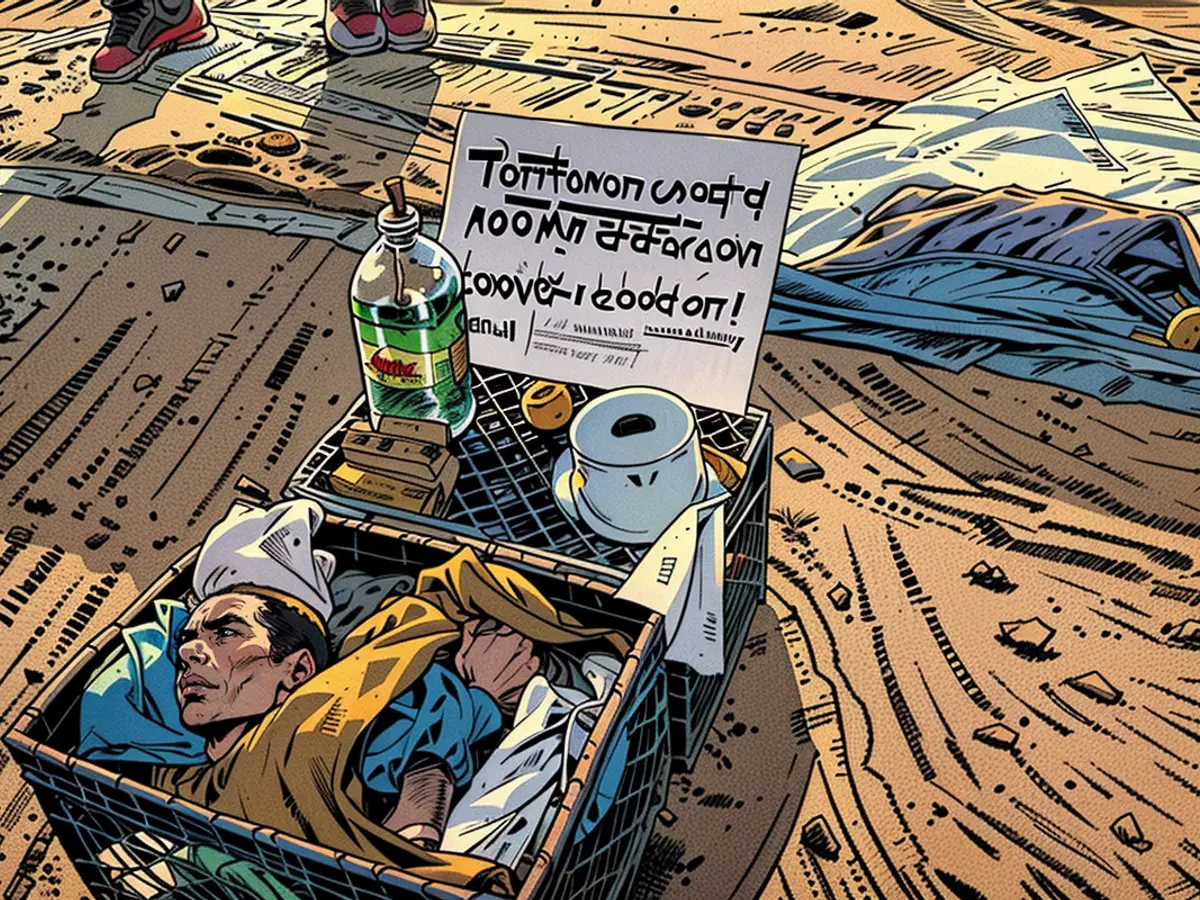Deadliest Mexican election ever triggers fresh influx of asylum-seekers at US border
A neighborhood business owner in Mexico City and a coordinator for a political party, Norma, contacted local authorities in November due to loud noises coming from the building beside her house. According to her, the building was used by a rival political party.
The outcome of the police investigation is unknown, but Norma began receiving ominous warnings. Men would approach her in the streets and claim that she would not live for long. She tried to move into a family member's residence, but soon discovered that she was being pursued.
After the recent municipal elections, which were teaming with violence, she decided to relocate to ensure her safety. "After the vote, tensions escalated in my town." CNN only uses her first name to protect her identity.
CNN came across Norma and her three children, aged 13, 8, and 2, on a dusty Arizona road shortly after they crossed the fence separating the US from Mexico. These families, along with many others, are migrating due to the aftermath of Mexico's chaotic national elections, which resulted in a significant number of political figures being executed and numerous others being threatened.
All of these individuals seek asylum in the United States. However, they were unaware of a recent executive order by President Biden prohibiting asylum requests from illegal border crossings during times of high volume.
A short distance east of the border, more Mexican families had been sheltered in a tent built by a local relief organization. They were provided with water bottles and signs indicating that they should wait for Border Patrol agents to appear before venturing any further in the scorching heat.
Some of these families fled chaos, lack of employment, and kidnapping threats toward their own relatives. Two men, one claiming to have a family seated on the ground in the sweltering heat, also mentioned that they had fled Mexico after the elections. They stated they were harassed due to their support of a different candidate by people in their local election.
“We had not voted for the candidate; they forced us to.”
A tide of political murders and terror
Officials in the US have been monitoring for any migration surges this summer, and the election violence in Mexico is just one possible cause.
According to past comments from a Homeland Security official, uncertainty engulfs everyone when it comes to elections in Mexico and the US. This is especially true for the migrant population.
The June 2 election marked the largest and most violent in Mexico's history, with over 20,000 electoral positions up for grabs. Numerous brutal acts committed by those attempting to sway the vote resulted in the deaths of 34 political candidates and contenders at the hands of criminal organizations during the campaign season.
More than 300 candidates received threats, and many abandoned their candidacies out of fear for their lives.

Zissis Carin, a Mexico expert and Americas Society/Council editor-in-chief, said she was not surprised by the recent migration of Mexicans fleeing their communities due to escalating violence after the violent elections. "The violence and threats permeated the election and the candidates themselves, officials within the parties, and even families of candidates," she said.
"The purpose of the violence was to create a fearful environment that would allow a group or party to establish control over local police and financial resources."
Zissis told CNN that while ballots were still being tabulated, more attacks occurred. Yolanda Sánchez Figueroa, the mayor of Cotija in Michoacan state, was assassinated the day after the election while walking home from a gym with her bodyguard. They were shot by individuals in a white vehicle, as mentioned by the state attorney general in a statement.
Alliance between US and Mexico to regulate border management
Mexico is actively working with the United States to reduce migratory pressure near the border, with multiple state agencies trying to deter or redirect asylum seekers from various parts of the world away from the US-Mexico border. However, this may be exacerbating the internal security crisis in Mexico, causing citizens like Norma to join the migration towards the north.
Salvador Guerrero, the director of the Alaide Foppa Refugee Legal Clinic in Mexico City, fears that the government's dedication to acting as a migration buffer for its northern neighbor has diverted resources and focus away from addressing interior security issues.
"The National Guard was created to safeguard Mexico," he said to CNN. "However, for every criminal they hand over to a judge, there are 80 migrants who are also relocated from the north to the south."
"This lack of resources and attention dedicated to inner security matters further exacerbates the situation and feeds into the impetus for Mexicans to flee their homes."
In Mexico, impunity continues to thrive as the country experiences a high rate of homicides and over 100,000 individuals have vanished without a trace, according to think tank Mexico Evalua. An alarming 95% of all crimes throughout the nation went unsolved in the year 2022.
Though President Andres Manuel Lopez Obrador's social welfare programs have alleviated poverty for numerous Mexicans, the deterioration of democratic safeguards and institutions under his tenure is causing significant strain for those who find themselves politically at odds.
As Lopez Obrador's term draws to a close, he prioritizes various reforms, many of which could potentially weaken the everyday functioning of democratic institutions nationwide, highlighted by AS/COA editor Zissis.
These initiatives include abolishing the proportional representation of lawmakers, crippling autonomous regulatory bodies, and implementing direct elections for Supreme Court justices. The Morena party defends these steps as efforts to establish a more direct democratic system; however, critics argue they would undermine the system of checks and balances in the government.

Zissis contends that "these may seem like minor details, but they hold profound implications for Mexico's democracy and the ability of opposition groups to maintain a voice."
Claudia Sheinbaum, the president-elect, will begin her tenure on October 1st. Often seen as the protege of Lopez Obrador, it remains uncertain whether she will follow in his footsteps on security, border management, and government reform.
A harrowing journey brings Norma and her family across the desert to reach Arizona. They took a flight from their hometown to Hermosillo, then a truck to a border town, and eventually crossed on foot. Along their path, they passed abandoned water bottles, diapers, ID cards, and clothing, left by the countless immigrants who had already made it to the land of the free.
As they approached the frontier, Norma's 13-year-old daughter fretted, afraid that people in Mexico might recognize her mother from television. Even the two-year-old clung to her mother and begged for faster movement, exclaiming, "Mama, let's go!"
A tent awaited them at the end of this arid trek, offering no provisions, air conditioning, or comfort. The merciless heat of the Sonoran desert approached 111 degrees Fahrenheit (43.8 Celsius).
Today, asylum requests are no longer an accessible option for those crossing the border illegally, regardless of their circumstances. US President Joe Biden signed a proclamation that bars illegal border crossers from seeking asylum once a certain daily quota of illegal crossings is exceeded. Although asylum seekers can still request an appointment to present their case at a port of entry through the Customs and Border Protection app.
This initiative has generated significant debate. Naysayers claim it does not adequately address the mounting number of immigrants entering the country, surpassing the capabilities of the existing immigration system. Advocates for immigrants fear that shutting the border to asylum seekers endangers vulnerable people, ultimately compromising border safety.
Norma and her children were captured and detained by Border Patrol on Friday upon arriving in the United States. By Monday, they had been deported back to Mexico, where they currently fear to leave their homes and their children are not attending school.
Throughout their deportation process, they experienced polite treatment from US agents who took their DNA samples to confirm the relationship between Norma and her children.
Yet, she was denied the chance to divulge her reasons for fleeing. "They simply said that wasn't an option," she told CNN on Monday. Speaking from her Mexican residence, Norma acknowledged the respectful treatment from the US agents but lamented the absence of a chance to explain her situation.
Previous reporting from CNN contributors: Priscilla Alvarez, Tara John, and David Shortell


Read also:
The surge of asylum-seekers at the US border is largely due to the violence and political instability following Mexico's highly contested elections. Many Mexicans, like Norma, fear for their lives after receiving threats due to their political affiliations.
The elections in Mexico were marked by a tide of political murders and terror, resulting in a staggering number of deaths and threats against political candidates and their supporters. The violence was orchestrated to create a climate of fear and establish control over local police and resources.







